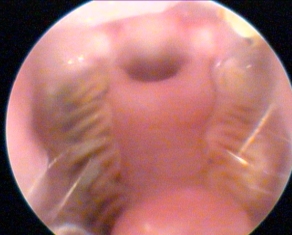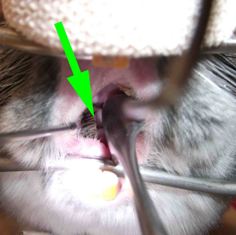Dental Problems: Chinchillas
Chinchillas have constantly growing teeth (incisors, premolars, and molars). Dental problems are very common in pet chinchillas if they do not get proper diets. A chinchilla should always have available a large amount of high quality timothy hay, such as Oxbow Timothy Hay, which helps wear the teeth and provides enough fiber to promote their gastrointestinal health. If a chinchilla does not get enough timothy grass hay, the teeth may grow in unusual shapes due to a lack of tough material to physically grind the biting surface of the teeth. Pelleted food, alfalfa hay, and leafy greens and other produce are soft and do not cause the chinchillas to chew vigorously side to side as timothy hay does.

This is a picture inside a chinchilla's mouth showing the lower cheek teeth, tongue, and opening to the trachea. The edges of the teeth are irregular, compared to a normal chinchilla's mouth. This created "lingual spikes" that interfered with chewing and irritated the tongue.

The green arrow points to sharp edges that are cutting into the tongue. These points are corrected by filing to a more normal shape.
In some cases, the teeth grow in ways that trap the tongue and prevent the chinchilla pig from being able to drink!
Dental disease can develop for a variety of other reasons. For example, some chinchillas may be born with abnormally shaped teeth that simply don't line up for proper grinding. Injuries to the mouth, skull, or jaw bone may cause the teeth to grow at odd angles. Tumors may also start to deform the shape of the teeth.
Some chinchillas require such frequent teeth filing that extraction of the abnormal teeth is a better option. Occasionally a chinchilla may need all four front teeth (incisors) extracted because they grow in at such abnormal angles and require filing every few weeks. Extraction of an incisor is a delicate procedure and a chinchilla will require lots of special attention afterward until its mouth heals. Fortunately, most chinchillas do quite well without any incisors. Some chinchillas have had all their cheek teeth removed and do well.
The single most important thing you can do to prevent teeth problems is to restrict the amount of pellets your chinchilla eats to ensure that it chews enough timothy hay to wear down the teeth. Timothy hay should be available at all times. Pellets should be offered so that the whole bowl is eating within a few hours and the rest of the time your chinchilla has to eat the hay.
For adult chinchillas, we recommend 1/8 cup of a high quality pellet designed for chinchillas (e.g., Oxbow Chinchilla Deluxe). Growing and pregnant chinchillas should always have their bowl full.
Make sure to bring your chinchilla in for regular physical exams performed by our doctors. We'll check the length and condition of its teeth. If your chinchilla has ongoing problems, we recommend a check every 4 months so that we can tackle problems before they impact its health. If we find that the teeth are overgrown, we will set up an appointment to file your chinchilla's teeth under general anesthesia and administer other treatments that may be needed.
A chinchilla with dental problems may drool, have stained or matted fur on its chin and jaw, a loss of appetite, a shift in appetite to only its favorite foods, a change in the quantity or consistency of its feces, or even eye problems. If you are at all concerned that your chinchilla may be developing dental disease please make an appointment for an exam!



